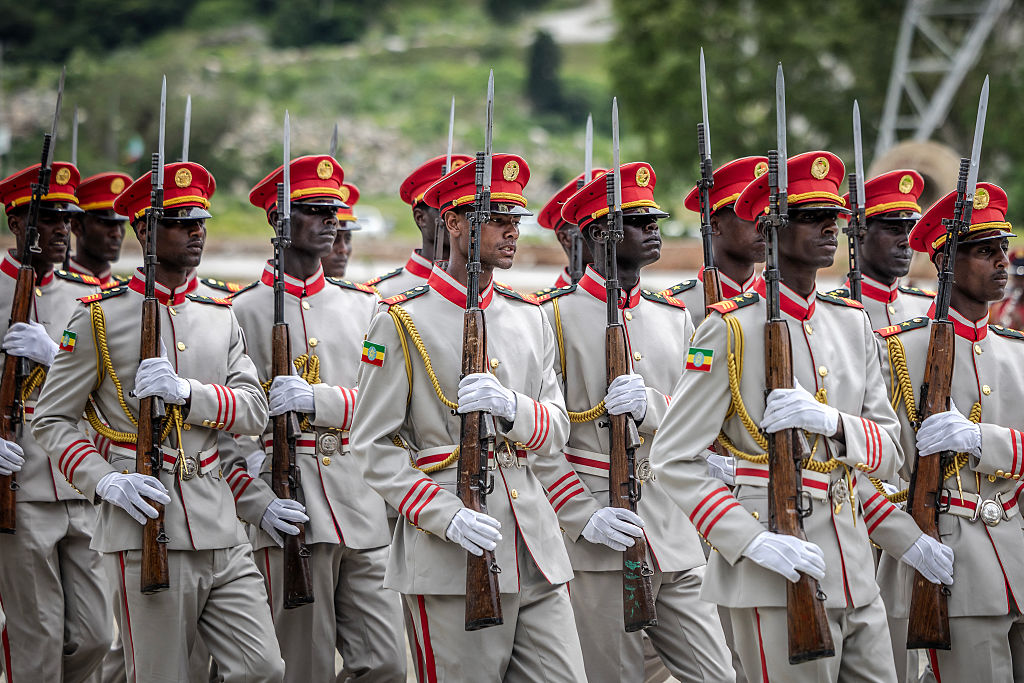Tensions are rising in the Horn of Africa as Ethiopia accused neighboring Eritrea of “actively preparing to wage war.”
In a letter addressed to United Nations Secretary-General António Guterres, Ethiopian Foreign Minister Gedion Timothewos said Eritrea is “funding, mobilizing, and directing” armed groups inside Ethiopia including the Fano, an ethnically Amhara militia. Gedion also accused the Red Sea nation of collaborating with a hardline faction of the Tigray People’s Liberation Front (TPLF) to fuel violence in northern Ethiopia.
He warned that if it continues, Ethiopia’s military will have no choice but to respond.
“The Ethiopian [National] Defence Force has adopted a defensive posture and tried to contain the situation,” Gedion wrote. “This is because of our policy of maximum restraint. However, it should be noted that the policy is not one of indefinite restraint.”
In a response on X, Eritrean Minister of Information Yemane Ghebremeskel said the letter was an act of “duplicity in its extreme” and accused Ethiopia of “reckless and provocative saber-rattling.”
Ethiopia is emerging from a brutal civil war that killed hundreds of thousands and displaced millions. The war officially ended with the signing of the Pretoria Agreement in 2022, but peace has not taken root. A national disarmament, demobilization and reintegration process for fighters has been slow and incomplete, and the TPLF has splintered into two rival factions jockeying for control of the north. The Fano, unwilling to lay down arms, are waging war against government forces in the Amhara region.
In this context, wrote analyst Gelila Enbaye, Eritrea is playing a “spoiler” role and supporting the Fano and the TPLF under a philosophy of “the enemy of my enemy is my friend.”
“Ethiopia today might be labeled as a post-conflict context; yet its recent history serves as a cautionary tale, revealing how quickly so-called peace can unravel,” Gelila wrote for the website Africa is a Country. “Eritrea, a pariah state and a daunting diplomatic challenge, remains a dangerous spoiler.”
Heightening the conflict between the two nations is Ethiopia’s desire to regain access to the Red Sea Port of Assab. The port city has been part of Eritrea since the country won its independence in 1991, which left Ethiopia landlocked. Recently, Ethiopian leaders have used aggressive rhetoric saying they intend to regain access to the port. In a September Facebook post, the Ethiopian Army said it was willing to “pay any price” to take the port back.
In an interview with ADF, Dr. Michael Woldemariam, an associate professor at the School of Public Policy at the University of Maryland and an expert on the Horn of Africa, said the hostile words between the two countries might mean they are reaching “an inflection point” where armed conflict is more likely.
“The tension between them has become much more explicit, so that certainly suggests that we should be increasingly alarmed by the trajectory of tensions between the two countries,” Michael said.
Limited independent reporting in the region makes it difficult to know what concrete steps the two countries are taking to prepare for war. There have been rumors of a force mobilization near Assab and accusations of weapons purchases, but nothing is verified, Michael said.
Above all, observers fear a new war in Tigray, where 878,000 people are still internally displaced, according to a 2025 U.N. report.
“What’s particularly concerning about a war in northern Ethiopia involving Eritrea is how fragile humanitarian conditions already are,” Michael said. “And if you layer armed conflict on top of that, it would be catastrophic in terms of the collapse of basic service delivery and the migration that would ensue.”
Michael also fears that a war between the two countries could be intractable with both sides arming militias and seeking help from external allies such as Egypt for Eritrea or the United Arab Emirates for Ethiopia. The example of the Sudanese civil war, he said, shows how difficult conflict is to stop when it becomes a proxy war for other global powers.
“This is likely to be a multisided conflict with a bunch of different parties and the more hands you have in the conflict, the more difficult it is to resolve,” Michael said. “So, I really do share the view that this would be quite a calamity for the entire region.”

